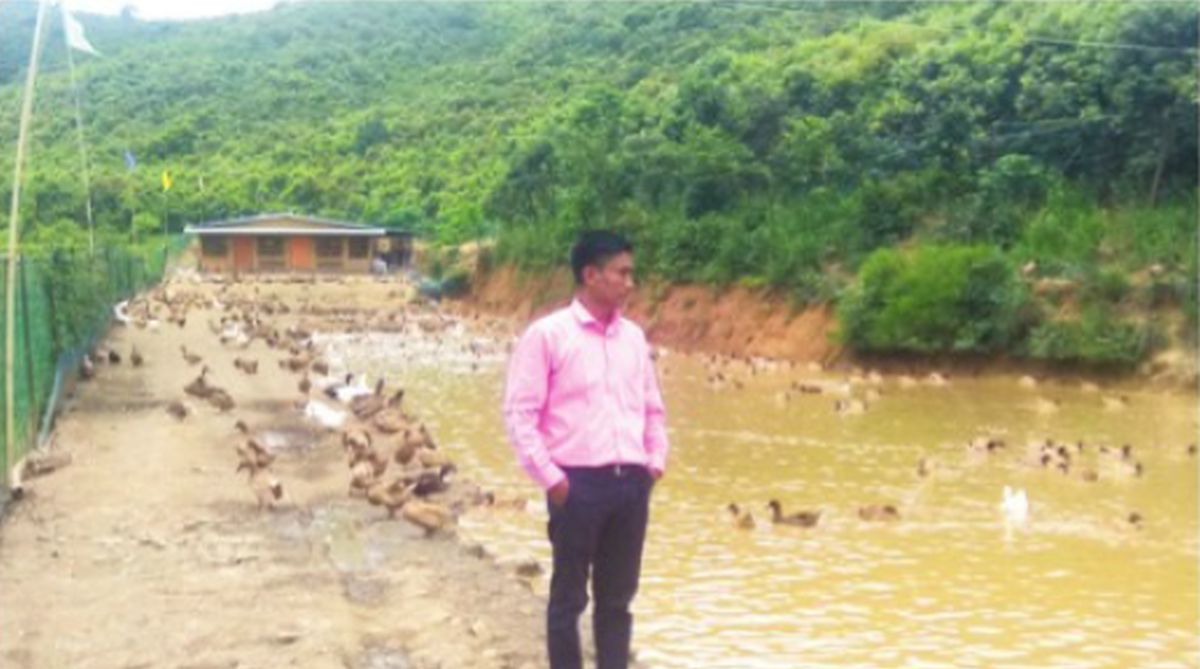Manipur has been labelled a failed state. Not only do armed militant groups hold sway in several areas, the unemployment rate is quite high with jobs allegedly being auctioned off. Likewise, government developmental schemes exist only on paper and if one wants to avail a loan, they must be prepared to grease the palms of babus. At the end of the day one is left with little or no money to implement the actual project. The story is almost the same with the banks or numerous NGOs that dot the place. In fact one could call it a functional anarchy where the state seems to have withered away without a revolution.
It is against this backdrop that one stumbled upon a thriving village republic, which is operational 24×7 for 365 days and all without a single rupee from the government or any international NGO. Nongpok Sanjenbam is a sleepy village in Imphal East District, some 20 kilometres from the state capital. The first sign that greets one is the clean road leading to it with bamboo weave dust bins on either side lined up 50 feet apart.
Advertisement
Welcome to “Langei”, or treasure house in the local Manipuri, where the seemingly impossible has occurred thanks to 44-year-old Telem Arun Kumar. He was educated in commerce from Dhanamanjur College in Imphal and is the fifth of eight siblings born to Telem Tombi and Telem Ongbi Ibeton of Nongpok Sanjenbam. Kumar nurtured a desire to rise from poverty, which plagued his family as they were landless farmers. A sense of self-sufficiency was perhaps the launching pad.
Kumar left home in 1990 to seek his fortune in Imphal and that too without depending on the state government. He soon established the “Self Employment Union of Manipur”, which was aimed at providing employment to village youngsters by instilling in them a sense of participation in the local economy. He began by subscribing Rs 1 every day from each of the participants and ploughing it back to them.
Then Kumar finally returned to his village, some 20 years later and was distraught to find it in the same condition in which he had left it. The same poverty stalked the 700-odd villagers — almost all of them being landless farmers — but most hit the bottle, whiling away their evenings in a drunken stupor. That was when he decided to try out the employment model he had nurtured in Imphal.
Kumar began a door-to-door campaign covering the 150-households individually and tried to convince them about the need to get out of the poverty trap in which they had been ensnared. He was rebuffed most of the time but remained undeterred, beginning with Sunday meetings in which only five or six people would turn up.
Then on 2 January this year, Kumar launched his Langei Project and began operations by cutting grass in the village’s five acre meadow. He captured the attention of youngsters by forming the Langei Sports Academy in which 105 people were enrolled. Thereafter, he purchased a second-hand bus to cart them around.
Kumar convened a meeting for the women folk of the village and convinced them that they could earn a living by weaving the traditional clothes of Manipur, which will always be in demand. Since, almost all Manipuri women are adept in the art of weaving, they were soon convinced about the feasibility.
The weaving technique he utilises is not handloom but a more ancient one called loin looms, which although is more labour intensive, occupies much lesser space. The wraparounds that Manipuri women wear are called phaneks and they have to be woven on loin looms. Altogether 150 women, ranging from old widows to college students, are employed in his loin loom project with each earning a minimum of Rs 500-800 daily. The produce is then marketed through his office.
Nungshitombi Devi, who is a college-going girl, said that by working after college hours and on holidays, she is able to earn about Rs 5,000 a month to supplement her parent’s income. 67-year-old Nameirakpam Ibetombi said that she could spin about five kilograms of yarn every week, which fetched her about Rs 2, 000 daily. Kumar pumped in around Rs 20 lakh to construct the weaving shed and office complex apart from two other important structures —one is meant for ducks and the other for chicken. He said that the labour for the construction of the structures was provided free by the villagers themselves and thus, he was able to cut down on costs.
The chicken coop contains 5,000 birds of various breeds, which is normally marketed for its meat. The monthly turnover of Langei is approximately Rs 10 lakhs. He manages his office with an administrative support staff of 10 besides 50 other men from the village who are employed to look after the ducks and chickens.
Apart from the aforementioned projects, Kumar has provided five kilowatts of solar power for street lighting and has installed 22 close circuit television cameras around the village with a big monitoring screen in his office room. There is an array of loudspeakers installed around the village for communication and on which the daily news broadcasts from All India Radio is relayed, so that villagers can keep abreast of happenings around the world.
Married to Pramoda, Kumar has two daughters and said that he has no political ambitions but instead talked about his plans to adopt another village. This Good Samaritan summed up by stating that with the proper will, village republics can be turned into a reality anywhere in Manipur.
The writer is the Imphal-based special representative of The Statesman.











